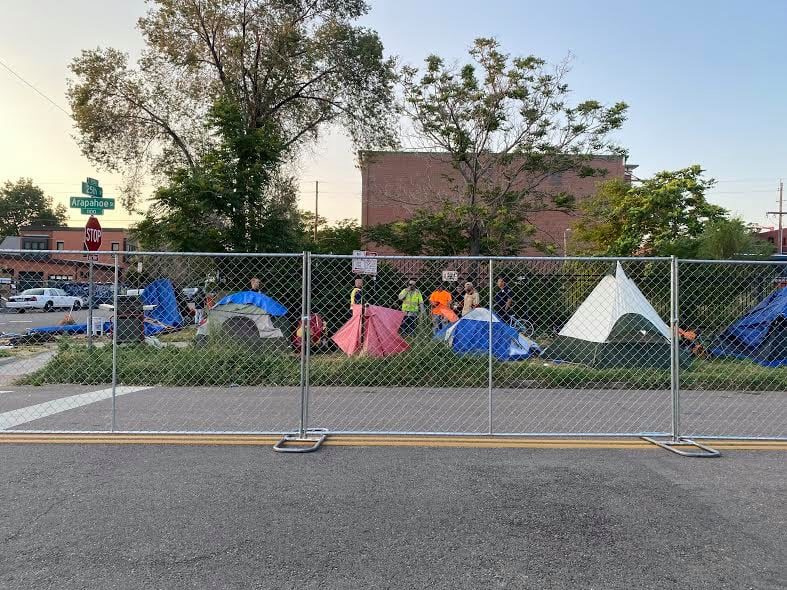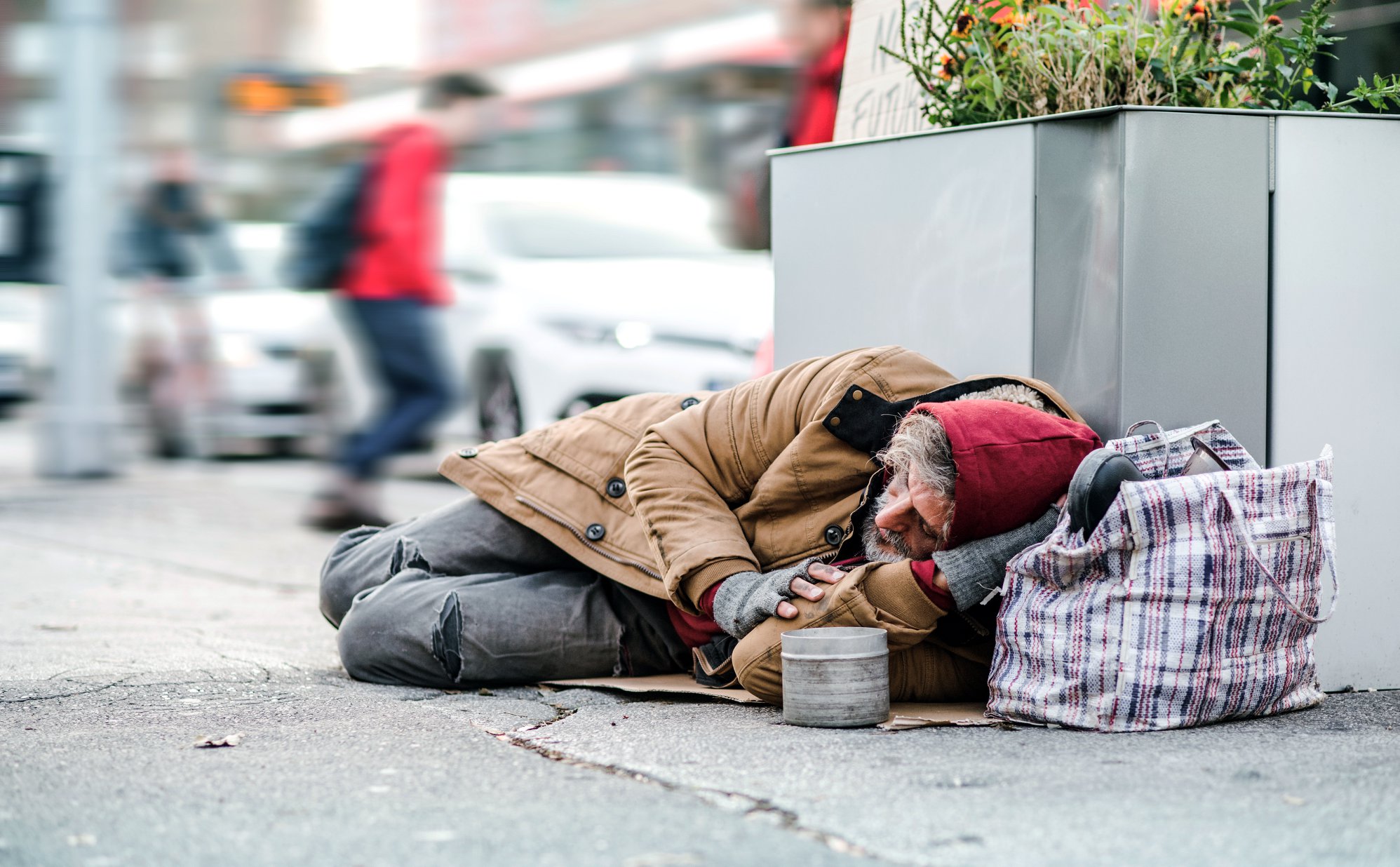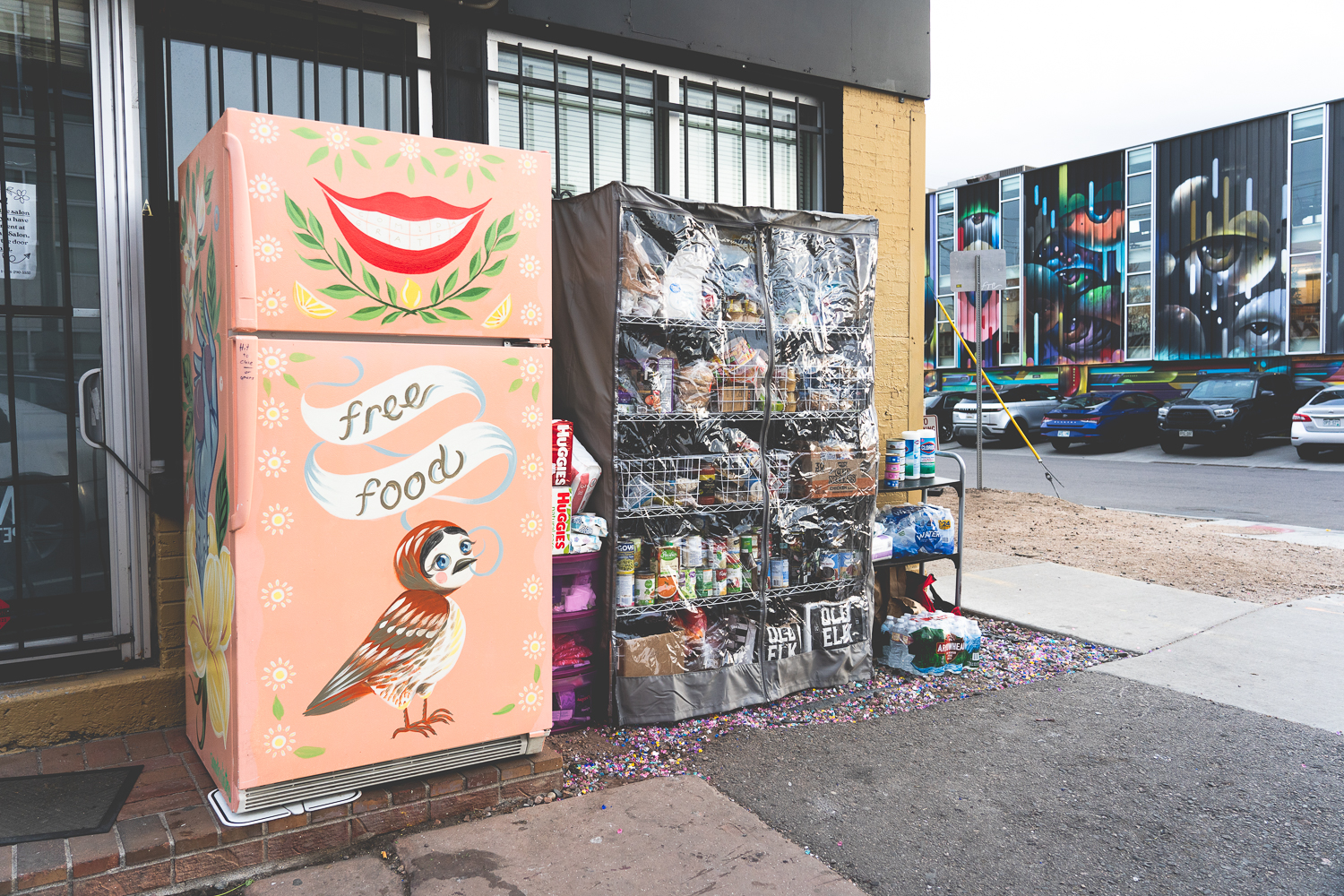“When trying to find solutions to the housing crisis, it seems the only approach has been everything but housing,” said Benjamin Dunning with Denver Homeless Out Loud (DHOL). The advocacy group recently published its report, “Swept to Nowhere: Experiences and Recommendations from Unhoused People During the COVID-19 Pandemic,” which found that over 70% of homeless people return to a location they were displaced, or “swept,” from – an effort that cost the city over $400,000 last year.
Dunning said the housing crisis in Denver, and the country for that matter, traces back to the ’80s when the budget for low-income housing was cut by nearly 90%, largely to fund more military endeavors. It left America’s expanding cities and vulnerable poor overburdened while handing housing off to the hands of for-profit, wealthy real estate developers. He argued that every change in the city’s zoning code since has been tailored to support high-end, expensive developments. “The tents are just the tip of the iceberg,” said Dunning. “They [city government] are cruel and stingy towards homeless people and they refuse to meet the needs of the city.”

When the average house on the market runs over half a million dollars, it’s only natural for a housing crisis to occur. In its 2020 State of Homelessness Report, the Metro Denver Homeless Initiative found that over 30,000 people in the metro area are experiencing homelessness, citing a lack of affordable housing.
“Poor people are largely associated as being inherently lazy, drug-addicts that deserve what is happening to them,” said Dunning. He argued that dehumanizing rhetoric around the poor – combined with a general lack of awareness on the issue on behalf of the public – is why the city can silently “sweep” people off the streets like they’re disposable. “We are so quick to bury history in the news that we are covering.”
Earlier this year, a group of residents in Park Hill sued Colorado Village Collaborative (CVC), the City of Denver, Park Hill United Methodist Church, Pastor Nathan Adams and Zoning Administrator Tina Axlerad, over a proposed safe outdoor camping site that would house 40 homeless people. That lawsuit was dismissed by Denver District Judge A. Bruce Jones, but other groups are in on similar efforts.
Safe and Sound Denver, a neighborhood advocacy group, plans to introduce a repeal measure to the city’s Group Living Amendment – which went into effect last February – as a ballot initiative this November. The group mentioned concern about the amendment’s inconsideration to nearby residents and an impending “failed policy,” citing cities like Portland, Seattle and San Francisco that have introduced similar measures.
The amendment, which officially legalized and increased the number of unrelated adults permitted to live in a house up to five, made an existing and widespread housing dynamic legal. It also provides an affordable and equitable option for housing, according to the City of Denver.

Safe and Sound has been keen to note that homeless people, in overwhelming numbers, struggle with some kind of mental health issue or addiction. Some argue that those problems have been taken out of context to encourage negative stereotypes about poor people being inherently problematic.
“They don’t want to see their property values go down in their neighborhoods,” argued Ean Tafoya, head organizer of Headwaters Protectors, an advocacy group that provides compassionate water and trash services. “There are ‘everyday’ people in your neighborhood that do drugs and similar things that homeless people are doing,” explained Tafoya, “but because these are homeless people, they get criticized more heavily for it and it gets fixated on.”
According to Dunning, city efforts – aside from accepting trash collected by volunteers and community organizers – continue to circle the only viable option, which is available housing.
Remember when Denver replaced police officers with healthcare professionals to respond to crisis calls last year?
The city launched the Support Team Assisted Response (STAR) pilot program in June 2020, when social justice and police reform were at the forefront of every headline. That six-month program was successful, but Mayor Michael Hancock chose to introduce it as a downgrade version of itself. The Denver Street Enforcement Team, announced last month, will replace police officers with unarmed civilians in crisis related to homelessness.
“We are investing in this approach, adding $1 million to continue the expansion of the STAR Program so people in crisis are met with behavioral health professionals instead of uniformed officers. A new civilian Street Enforcement Team will address lower-level infractions, and we are working on a new Assessment Intake Diversion Center. This AID Center will create an additional alternative response to the criminal justice system. On calls where a uniformed officer may be required, we can better guide individuals with mental health or substance misuse challenges away from being booked into jail, and instead connect them to more appropriate services,” said Mayor Michael Hancock during his State of the City address on July 26.
To qualify for a job with the Street Enforcement Team, applicants must have “one year of experience in regulation compliance, enforcement, safety, community outreach, customer service or similar experience,” according to a recent job posting. The wage range for a team member position is $18.94 – $28.41.
“You get the mall cop kind of thing,” said Dunning. “These are going to be people who are uninformed about trauma and the community and just criminalize people further.” The team is not permitted to make arrests but can issue citations and enforce rules on behalf of the city.
“Our biggest concerns are that this continues to be further criminalization of homelessness,” explained Tafoya. “We believe the justice system is already at its limit and we don’t believe that it can solve an economic problem. We’re concerned for the safety of individuals who are going to be issued citations from people pretending to be their friends.”

Still, neither Tafoya nor Dunning see the city’s new program as a step in the right direction.
Dunning, who’s been advocating for homelessness for years in Denver, points to non-government, citizen-organized efforts that take the issue into their own hands. For one, mutual aid groups have been expanding since the pandemic, like Headwaters Protectors, Feed the Streets, Cats not Cops and community fridges that began popping around the city last fall.
READ: Community Fridges in Denver Address Some of Our City’s Biggest Problems
Now, the Denver Basic Income Project plans to launch this upcoming September and will begin studying the effects of universal basic income on Denver’s homeless population.
The project will study the impacts of no strings attached direct cash payments to homeless individuals. One group will receive a direct payment of $6,500 and an additional $500 for 11 months after, the second group will receive a monthly stipend of $1,000 for 12 months. The third group will receive 50$ a month for 12 months in a comparison group.
Dunning says a project like this is overdue, but hopes it only proves what he’s known all along. “This gives folks money they need with no questions asked. When they’ve done this with other studies, we’ve seen that people use the money to literally just take care of themselves,” said Dunning.
It’s a start, said Dunning, who hopes citizen-led initiatives like these can boost the public’s perception, while changing the dialogue about homelessness and poverty. “People are people, they have stuff that happens in their everyday lives. They don’t deserve to be in a constant state of fear or punishment for it.”






There are two aspects of this issue that the article does not mention. The first is that there is a decent subset of the Denver homeless community who don’t want to be housed and are simply unrepentant drug addicts and criminals. Advocates can try to pretend all they like that every homeless person is a tragic victim who just can’t be seen as responsible for their actions, but those of us who actually live in the metro area and pay attention have seen proof that this is not the case. Placing these folks in the same category with good, ethical, law-abiding homeless families or individuals uprooted by the economy is an insult.
The second is that 303, like several other local media sources, displays a clear and dramatic bias against those community groups concerned about the consequences of the city’s total failure to police and control the homeless camps that can be seen throughout the city. The advocates interviewed for this article try to claim that ” “There are ‘everyday’ people in your neighborhood that do drugs and similar things that homeless people are doing,” but that such a massively faulty equivocation that it borders on total fabrication. Find me towers of stolen bicycles in people’s front yards and then cops who refuse to retrieve them for the victims because they’re scared. Find me a street in Denver without a homelessness problem where used syringes litter the sidewalks like confetti after New Year’s and junkies pass out right across the sidewalk. I wonder how the businesses over on 17th street feel about the issue, with the encampment fire that happened right next door to Steuben’s when one of those idiots combined fireworks and propane? Being concerned about crime from an illegal encampment isn’t “dehumanizing” the homeless, it is protecting your family from obvious dangers, and people who break major laws need to be arrested, no matter where they live. What an incredibly dishonest statement — does Tafoya really think that criminals who live in houses don’t get pursued and arrested when they break the law? And it is fair to say that in Denver, the opposite of that claim is frequently true — the police have refused to engage criminal behavior from and in illegal encampments because of the personal dangers involved and because of the ridiculous, pathetic slurs and vile categorizations leveraged against them by both the homeless themselves and by their blindest defenders.
Pretending that all the city has to do is make housing more affordable in order to suddenly transform the subset of homeless junky criminals into law-abiding citizens is the height of naivety. Does housing in Denver need to be much more affordable, with many more options for low-income citizens? You bet. Will making those changes help a bunch of people? Yes, and they should be pursued without delay. Will those changes also get the worst and most dangerous drug addicts and dedicated criminals (and don’t fool yourself — this is a substantial subset in Denver) off the streets and out of their encampments? Don’t count on it, even for a moment. Homeless advocates will make that claim because they think it will help them get funding for their projects — and so far, that has worked out well for them — but by no means should their bias be taken as more vital or a stronger goad to action than the concerns of the law-abiding families concerned for the safety of their children and property. Remember, Denver: if you call the police because your young children have had to navigate a sidewalk littered with naked used syringes and used adult diapers, you will be called an enemy of the homeless and even worse.
The Denver homeless already get twice the taxpayer support per person than a single child attending Denver-area public schools, and the homelessness problem has increased massively while that spending inequity has occurred. The definition of insanity is to continue to do the same thing over and over while expecting a different result to emerge.